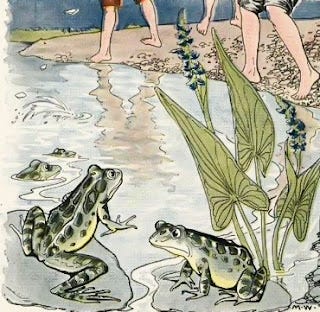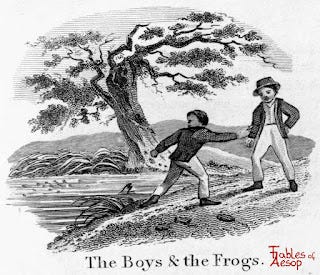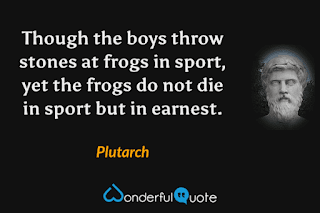Talking about Science: 1 Boys and Frogs
“Though boys throw stones at frogs in sport, the frogs do not die in sport, but in earnest”
So wrote Plutarch, the great Greek historian in the first century A.D., in his treatise on Moralia.
When I was a boy, I was throwing stones at frogs, and I did it for sport. I did not think at that time that what was sport for me did not feel like that for the frogs. Didn’t I have a conscience? Or was it undeveloped? Or, perhaps it was simply my lack of knowledge? When I think about it today, it seems to me that nascent conscience was there; I knew, or I felt, that I was doing something wrong. I knew that this activity was something I had better not be bold about in front of my mother.
That's me, at the age 7 or 8. Innocent looking but irresponsible and dangerous.
Today I am sorry for what I was doing then. Today I know what I did not know then, or even if I knew, I did not know it deep enough. I had not suffered enough myself to understand the suffering of other beings; I did not know enough about the life of animals. Thus, I think, knowledge not only makes our lives richer, in the sense that it helps us in more efficient functioning in the world, it not only enriches our general culture, but also, if properly utilized, it can make us better in the moral sense.
How do we acquire knowledge? We do it by experience, we do it by “osmosis” – learning by watching what other successful people do and assimilating their methods and habits - and we also acquire knowledge through the use of scientific methods. Science is supposed to provide us with knowledge that is well tested, true high quality knowledge. This is in theory, but what about practice?
While I am a scientist, I often talk to non-scientists. I realize that the image of science from outside is not the same as that from inside. Moreover, even when I discuss with other scientists, quite often we disagree about the goals and about the methods used in science.
What is better: knowledge or ignorance, hard truth or soft illusion? Ignorance may be bliss, as some people say, but I think it is blissful only in the same sense that addicts seek the bliss of their drugs.
When a boy throws stones at frogs, it can be merely ignorance, but when the boy grows into a man and continues to behave in the same ignorant way, there is something deeper wrong either with such individuals, or with a world that permits – even encourages – that sort of anti-human behavior.






Welcome to Substack, Ark!
I too learned this kind of cruelty from other boys, and luckily it wore off over time. However, I often think that if I had had my male parent around to show me the wonder of the streams, ponds & lakes. If he had taken me in hand at 5 or 6 years old and said, "come on, let's go on an adventure and find interesting things." If he had expressed some joy & wonder about life, and showed me how to handle tadpoles, frogs and toads. I might have learned something about respect instead of murder.